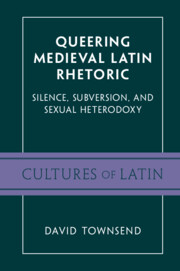Book contents
- Queering Medieval Latin Rhetoric
- Cultures of Latin
- Queering Medieval Latin Rhetoric
- Copyright page
- Dedication
- Contents
- Acknowledgments
- Introduction
- Chapter 1 Passing over Queerness
- Chapter 2 Reticence and Desire in the Devotional Works of Aelred of Rievaulx
- Chapter 3 The Deadly Play of Speech and Silence in Apollonius of Tyre
- Chapter 4 Hiding What Must Be Hidden
- Bibliography
- Index
Introduction
The Subversive Silences of Medieval Latin Rhetoric
Published online by Cambridge University Press: 15 January 2023
- Queering Medieval Latin Rhetoric
- Cultures of Latin
- Queering Medieval Latin Rhetoric
- Copyright page
- Dedication
- Contents
- Acknowledgments
- Introduction
- Chapter 1 Passing over Queerness
- Chapter 2 Reticence and Desire in the Devotional Works of Aelred of Rievaulx
- Chapter 3 The Deadly Play of Speech and Silence in Apollonius of Tyre
- Chapter 4 Hiding What Must Be Hidden
- Bibliography
- Index
Summary
Roman rhetoric, deployed as a legal and political tool and as a means of generating social capital, presupposes that the words of the speaker or writer initiate a dynamic, socially efficacious process of reception, and that that process is the real point of speaking or writing at all. Words shape audience reactions; and yet they can’t tightly and precisely control them. The text taken on its own proffers meaning in potentia only. It’s actualized in the reactions of its readers. But readers are multiple, never the reader. Communities of readers are always ad hoc and at best imperfectly coherent, and the consequent instabilities of reception open a space for the articulation of heterodox sexual identities. It is these less stable but potentially more productive aspects of preterition—and with them an expanded understanding of the device that goes beyond the textbook definition—that this book will consider, as they inform a select group of medieval texts whose readerships extended from late antiquity to the fourteenth century and beyond. Contemporary queer theory offers a useful framework through which to analyze these potentially subversive receptions of canonical texts.
Keywords
- Type
- Chapter
- Information
- Queering Medieval Latin RhetoricSilence, Subversion, and Sexual Heterodoxy, pp. 1 - 18Publisher: Cambridge University PressPrint publication year: 2023

